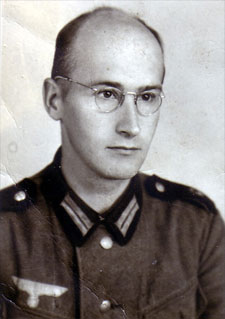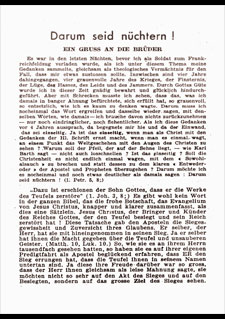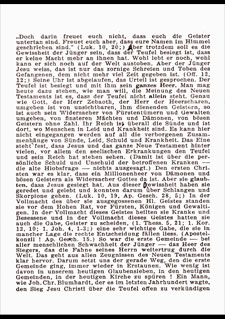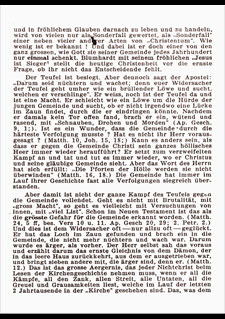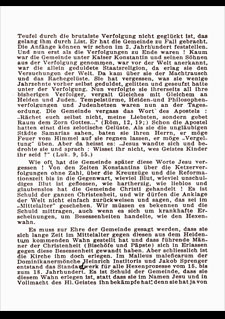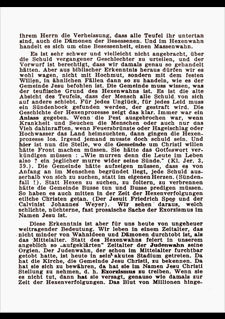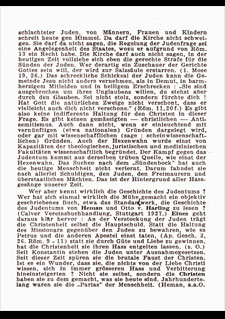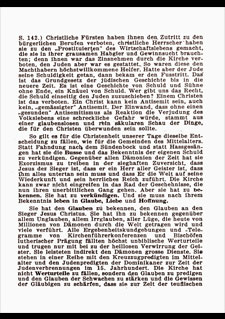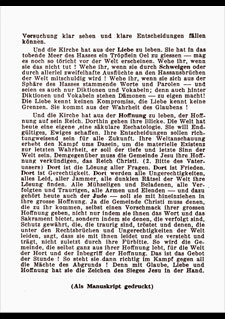Walter Höchstädter: Pamphlet against Killing Jews
One of the most impressive statements against anti-Semitism and racial fanaticism was penned by the Bavarian pastor Walter Höchstädter (1907–1994). Höchstädter had briefly sympathized with Hitler during the political turmoil of 1932 but became an opponent of National Socialism that same year following Hitler’s conduct during the Potempa murder. The treatment of political opponents, the Gleichschaltung measures, the abolition of freedom of the press and, not least, the racial policies after the Nazi seizure of power on January 30, 1933 also contributed to his opposition.
His father Emil, a member of the anti-regime Lempp Circle, and Karl Barth’s theology exerted great influence on Walter Höchstädter. He was a member of the steadfast Confessing Church and suffered because of the Bavarian church government’s willingness to compromise. His friends included the Franconian pastor Karl-Heinz Becker, who had warned against National Socialism before 1933, and Helmut Gollwitzer, who actively collaborated in the Old Prussian Confessing Church and covered for the imprisoned Martin Niemöller in his parish in Berlin-Dahlem after 1937.
Höchstädter, a pastor in Kulmbach since 1935, was drafted into military service immediately at the outbreak of World War II. He served as a soldier in the campaigns in France and Yugoslavia until being deployed as a frontline chaplain in 1941. He detested the Nazis’ racial hatred and considered the war to be a crime. After deployments in Romania and Russia, he was stationed at the end of 1943 in the French military hospital in Annecy where he penned the pamphlet Darum seid nüchtern! Ein Gruß an die Brüder (Therefore Be Vigilant! A Greeting to the Brethren) in the summer of 1944. He had a run of 1,000 printed in a print shop and distributed them personally or by military mail.
He had been motivated to write his essay by the Nazis’ atrocities, which he himself witnessed in Russia and France or about which he had learned from reports, and a home leave during which his father had told him about the trial against Hans and Sophie Scholl and about the Lempp Circle’s Letter from Munich Laity. Looking back, Höchstädter wrote in his memoirs: I was never able to remain silent. I had to speak after our church leaders persisted in remaining silent about the atrocities of the extermination of Jews and the war crimes. (W. Höchstädter, Strudel, 262).
His essay stated: The blood of millions of slaughtered Jews, of men, women and children, cries today to heaven. The church may not remain silent here. It may not say, the resolution of the Jewish Question is an affair of the state ... There is no indifferent attitude of Christians in this issue. There is no moderate – Christian – anti-Semitism ... All of the statements of loyalty and telegrams from conferences of Lutheran church leaders and bishops made extremely unbiblical value judgments ... The church did not have to make value judgments but rather to preach the faith... and to sharpen the consciences of the faithful ... Woe betide it if it does not do that! Woe betide it if it becomes complicit in the world’s outbreaks of hatred by remaining silent or by making all kinds of dubious excuses!
“In the annals of the history of Germany during its Nazi period, Höchstädter’s letter, in its explicit and thoroughgoing rejection of the eliminationist antisemitic model, is an exceedingly rare and luminous document” (D. J. Goldhagen, Hitler’s Willing Executioners, 432). This is especially true because Höchstädter fundamentally condemned every form of anti-Semitism and thus also the Christian anti-Semitism, which was deeply rooted in the Protestant church. His pamphlet, which seriously put him in danger, went unnoticed by the Nazis. He was taken prisoner of war shortly after completing his essay. This also protected him from the consequences of a report by a physician from his military hospital to the authorities for “undermining the war effort and disseminating enemy propaganda.”
Source / title
- © 1+2: Private collection of Michael Höchstädter

